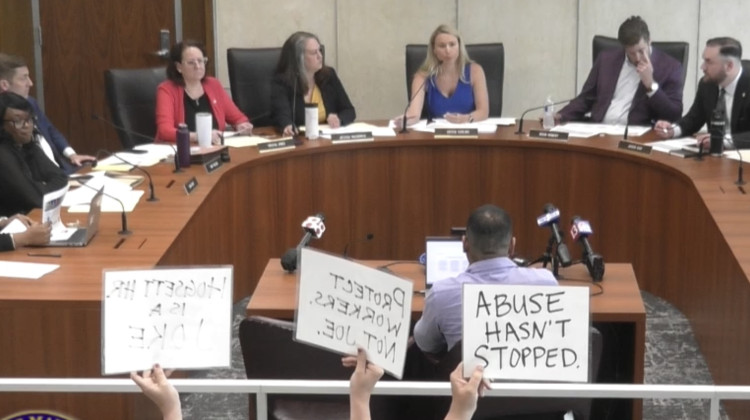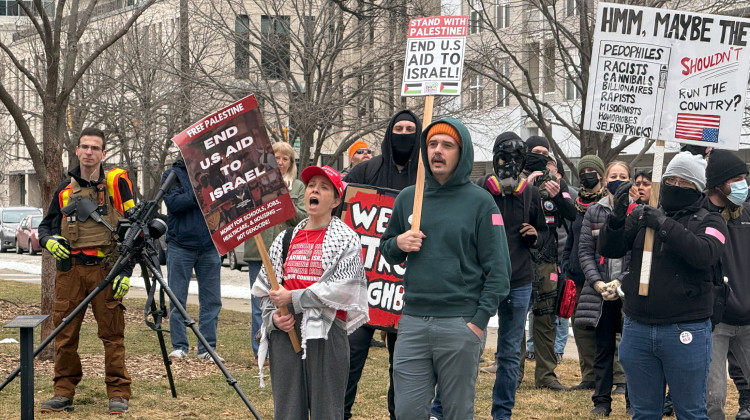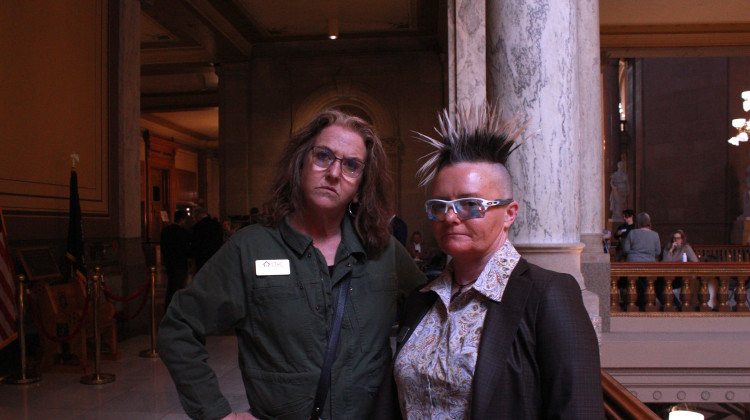
An investigative committee released the results of an independent investigation last month.
Screenshot from Channel 16“It’s about Thomas. Feel free to tell him I’m reaching out, I’m not afraid anymore.”
Lauren Roberts sent this text message to Indianapolis Mayor Joe Hogsett on May 12, 2017. Roberts was the first woman to speak out about the sexual harassment she experienced from former top mayoral aide Thomas Cook when she worked on Hogsett’s campaign.
“Keeping it to myself is really not an option anymore,” Roberts continued in her text to Hogsett. “I can’t keep going if there’s even a chance he could be victimizing someone else.”
It took two more women coming forward, three internal investigations and nearly a decade after the first alleged act of abuse to completely remove Cook from his “sphere of influence” in the city government.
While Cook is no longer involved with the Hogsett administration, more people are speaking up to emphasize that these are not isolated incidents. Many survivors of harassment, abuse and assault within the Indianapolis city government are making their voices heard, seeking justice in a system they say is fundamentally broken.
“The sexual harassment uncovered in Indianapolis government is part of a national systemic problem, and the challenges in adequately addressing the issue are disturbingly typical,” said Emma Davidson Tribbs, cofounder and CEO of the National Women’s Defense League, at a council committee meeting last week. “This process has revealed institutional shortcomings that discourage survivors from coming forward.”
Beyond a “single bad actor”
The investigation has spurred a larger conversation about misconduct in the Indianapolis city government and a culture that has enabled harassment and discrimination.
At last week’s meeting, Tribbs spoke as a proxy for seven individuals that have suffered harassment while working in the city government. Tribbs said the bravery of the women who had come forward has encouraged others to share their stories as well.
“The amount of public support that the survivors have and people who are coming forward spontaneously sharing their own stories, I think, is speaking very loudly,” Tribbs said in an interview with WFYI. “So yes, the seven was a new number, but for us, we know there's more.”
Tribbs and the National Women’s Defense League became involved after Indiana Senate Minority Leader Greg Taylor was accused of sexual harassment by six different women.
The NWDL tracks sexual harassment allegations in state governments and reported over 400 allegations against 145 state lawmakers nationwide since 2013, according to its 2024 “Abuse of Power” report. Tribbs said they were made aware of the allegations against Cook during their outreach to people who spoke out about Taylor.
“This is not a one-off thing. This isn't a single bad actor. This is a systemic underlying problem that is happening across the country, and we need a consistent strategy to start combating it,” Tribbs said.
Allegations of harassment and discrimination within the city government haven’t been limited to sexual abuse. Deandre Barker is one of the seven individuals Tribbs represented who came forward to share his story of discrimination while working for the Department of Public Works.
“I became permanently disabled while working for the City, and instead of receiving support, I faced retaliation and was fired because of my disability and many fabricated reasons,” Barker wrote in a statement, read by Tribbs at last week’s meeting. “I filed grievances, submitted medical documents, asked for help and even provided recorded evidence of my situation. Yet, nobody listened to me.”
“Retraumatizing”
The Indianapolis City-County Council passed a resolution last fall to form an investigative committee and commission an independent investigation into the city’s harassment and discrimination policies. But when law firm Fisher Philips released its report, the women involved said it left out key details, and councilors said the scope of the investigation was too narrow.
Investigative Committee Chair Crista Carlino said the investigation focused solely on past allegations, specifically against Thomas Cook, rather than looking into misconduct in other areas and assessing the harassment policies and reporting processes.
Carlino said when the council passed the resolution initiating the investigation, it was intended to be a broad investigation.
“The scope with which Fisher Phillips was given on our behalf was without committee or chair consent, and was clearly not in the spirit of the law written and codified by this council last year,” Carlino said during last week’s meeting. She alleged there was interference with the scope of the investigation, a claim council leadership vehemently denied. She has since issued a statement, apologized for remarks and said her claims were misconstrued.
For the survivors, the investigation was “a retraumatizing, victim-blaming process,” Roberts said. During a full council meeting on June 9, she was forcefully removed by sheriffs at the direction of Council President Vop Osili during her testimony about the investigation.
“I'm certain that your carelessness and refusal to find the truth about our cases in a trauma informed, survivor centered way have discouraged other survivors from asking for help or coming forward to report,” Roberts said in a statement addressed to the council.
“After all this, why would any other survivor trust the leaders of this city after what they've seen my friend and I go through?”
The aftermath
The night Roberts was dragged out of the council meeting, other survivors were there to share their own stories and make recommendations on how to improve harassment policies and reporting procedures.
“What I've witnessed and endured during my time in the administration was… a culture where sexual harassment was not confronted, but instead enabled through silence and inaction,” said Morgan Mickelson, the former Director of the Office of Sustainability. “That silence has consequences.”
Tribbs said while more people have been inspired to come forward after the original accusations, that likely still does not reflect the full number of people affected.
“In workplace situations, 85 percent of survivors of sexual harassment do not report their harassment. So we know, we always know, that there are more than what we're hearing about,” Tribbs said.
Survivors, advocates and members of the public have made recommendations to the council, including establishing an independent body to investigate sexual harassment, increasing sexual harassment training, strengthening whistleblower protections and implementing transparent reporting.
Tribbs said all of the recommended steps are needed, but that even more importantly, leadership needs to fully embrace them in order to truly change the culture.
“Putting these pieces in place is the first step. The second step is for leadership to really embrace them and to live by those rules,” Tribbs said. “If these kinds of changes aren't made now, I believe you will see more of these incidents coming forward.”
 DONATE
DONATE







 Support WFYI. We can't do it without you.
Support WFYI. We can't do it without you.